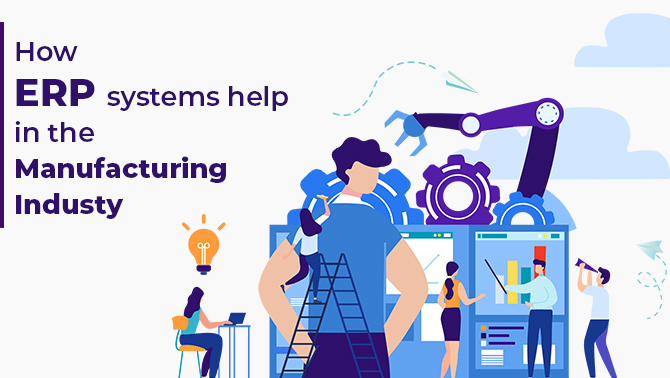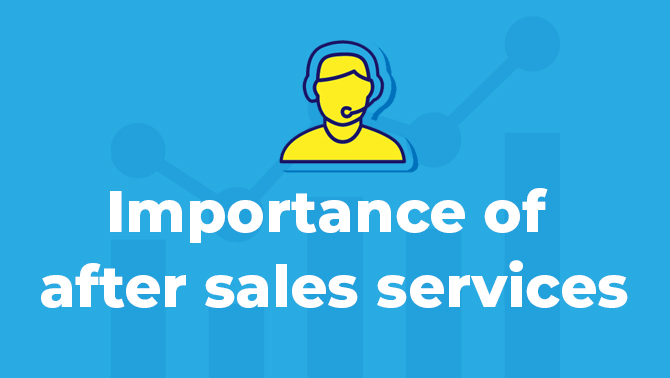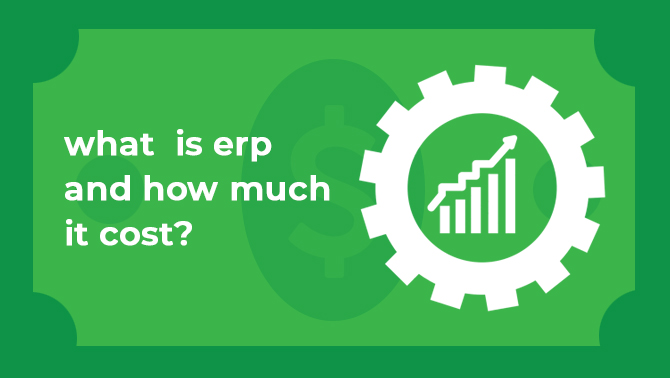
ERP software plays a notable role in maintaining the complex processes of a manufacturing organization. It seamlessly answers various issues and presents a variety of benefits to the manufacturers who are desperately looking for ways to manage the business growth, decrease costs, streamline day-to-day processes and gain a competing edge over other business entities across the market.
Business owners, seeking for manufacturing ERP advantages, can have superior ideas from the below benefits:
Streamline Processes: A full-fledged ERP software offers to the manufacturing enterprises an optimal level of technology solutions that can cater to all the requirements of the respected clients. As the business grows, their operations become more and more complex. The ERP manufacturing software automates all business processes, presenting accurate, real-time data. ERP enhances productivity & efficiency by encouraging users to navigate difficult processes, preventing data re-entry, and improving functions such as production, order completion and shipment.
Improved collaboration and communication: Manufacturing ERP software allows the business to share essential information with not only internal employees, but if you want, you can share the data with external business stakeholders like distributors, suppliers or even with the customers. This helps to boost the cooperation and communication which lead to a smoothing of activities among key business partners.For instance, when a vendor has a shortage of inventory, he/ she can use the best manufacturing ERP systems to get in touch with the sales team with new stock requirements. The same request can immediately be sent to the operations team and then the employees can manufacture the requested product to fulfil the vendor’s demand. Thus, ERP for the manufacturing process enables business heads to efficiently handle data from external parties to improve decision-making efforts.
Reduced costs: The best manufacturing ERP system offers significant cost reduction despite the initial investment. By integrating Manufacturing ERP software, you will increase business’s productivity, this will minimize overtime and related expenses significantly. Lower error rates and enhances precision in the production floor will help to reduce the scrap and rework that can increase manufacturing expenses.The best ERP software for manufacturing comes with features like inventory tracking, where you can track spare parts or other components effortlessly. Thus theses systems enable you to do proper product planning, reduce excess warehousing and inventory expenses. Finally, enhanced insight into every financial aspect of manufacturing can help recognize possible areas for savings and reduce the price of goods sold.
Quality management: ERP offers direct control over the management of quality. It will increase your abilities to control quality in the process chain by analysing and testing raw materials, and finished products. Management and Operation of the inventory become harmonized with uniformity of methods.
Better reporting: So far, without an ERP system, businesses can face numerous difficulties in creating a report with proper and accurate facts. However, through the manufacturing ERP system, report generation and maintenance tasks have become much reliable and easier.
Needless to say, implementing ERP within your manufacturing business will drive the much-needed momentum you need.
Manufacturing ERP offers detailed information so management can get a real-time and realistic glimpse of inventory levels. With further improvement in the ERP field such as mobile ERP and cloud ERP, manufacturing organization can boost productivity within the business. Manufacturing ERP software Enhances collaboration, automation, and improve process tracking and help your business to grow profitability while keeping the end customers satisfied.
CRIMS is an expert on integrating state of the art business solutions for manufacturing companies. If you have any questions or are interested in building your own ERP solution, get in touch with the best Manufacturing ERP software solution company in Delhi/ India. Our professionals are here to assist you 24/7.

Even after the sale, the business has to maintain a friendly relation with the client. With the closure of a deal, the organization cannot consider the relationship with the client. As a matter of fact, the business must not terminate his interest in the customer.
Many successful corporations utilize after-sales service policies to strengthen sales, develop fruitful customer relationships and grow their revenue. Offering quality after-sales service keeps your clients coming back to you and inspires them to refer your business to others.
After-sales support includes what you do at the time of sale, including your consumer service and selling methods. It further comprises how you follow up after the client has left, such as delivering follow-up communication and efficiently dealing with complaints.
This blog highlights the significance of after-sales service, so without wasting your precious time, let’s jump in on the importance of having After Sales Services:
Build Customer loyalty: Happy Customers are loyal customers. Like you and me, most of the customers enjoy personalised attention and care. Remembering your customer’s previous engagement with your business, their name or what they love, help your clients feel they “belong” to your business.
It is very important that you pay attention to your customer’s needs and interests. The individual attention of the seller towards the client’s satisfaction helps a lot in creating loyal customers for the business. If you are friendly and attentive towards the necessities of the clients, you will certainly see them entering your shop or business.
Increase sales with free promotion: Have you ever visited a store or website after getting a recommendation from a friend or family member? I am certain you did, so do I. It is a proven fact that people believe in recommendation more than even online review. If you are able to keep your clients satisfied they will definitely connect more people with your business, adding more sales to the organization. Hence, making sure your customers are satisfied is essential to get free promotion, increase sales and boost revenue.
Service Review: After a few days of the purchase, it is suggested that you follow up with the client regarding their satisfaction from the product or services. This after-sales contact is only to let the customer know you care for his/ her opinion, don’t put any sales pitch though! The goal is here to know about your service not to force them to buy more.
Maintain Communication: You can keep continuous communication with your client by sending emails or SMS to let them know about topics they are interested in. Now, this can be a time-consuming task, but it is crucial for business success, so to save your time and resource, you can use after sales service software to automate the entire communication process with the customers. If you are able to offer them all the information they need to know about their interests, they will much less likely to move to another place.
Customers support: This is the primary reason for having after sales service in the first place. Providing great support can work on many levels. You can contact your customer to make sure the product that you sold is working properly or not. This enables you to develop a caring reputation in the eye of the client which allows them to consider your business again while they are looking for buying anything. Additionally, to give them more reasons to stick around you can offer special offer, rebate or discount on customer’s second purchase.
There are many ways to offer after-sales services to your valuable clients, including newsletters and email marketing. With an automated series of personalized methods set by after sales service management software, you can easily follow-up with your customers and will give you the best opportunity to retain them and make other sales.
Crims can give you a hand in building your after sales support software. Don’t wait until tomorrow to make your sales, automate your after-sales services today! Contact us for more information.

Definition: An Enterprise Resource Planning system is a software packed with many features that can help you to do tasks like product planning, product development, accounting, sales management, inventory management, human resource and many more. Having this multitude of features in one software suite makes this too an essential part of any industry.
How Much Does ERP Software Cost?
This is a fair question. The implementation process of an Enterprise Resource Planning system or ERP system represents a significant investment of money and time.
To be honest, figuring out how much ERP system costs is a tricky question to answer. ERP systems are complex and there are multiple factors that need to be considered prior to a final estimate can be given.
However, understanding parts that influence the cost of the ERP will help give you a better idea of how much you can expect to pay.
Following are the key factors that influence the total price of ERP software:
The number of users: Irrespective of business type, most of the time ERP systems are priced on a per-user basis. So, the more users that need to access the ERP system, the costlier the licensing cost.
Type of business: It’s obvious that no two organisations are the same. For example, the wide size manufacturing industry will need a more robust and sophisticated system than a small service type business. To select the best manufacturing ERP software, conduct deep requirement analysis. Until you have done the analysis, ERP software vendors won’t be able to offer an estimation.
Third Party Add-ons: To increase the functionality of the manufacturing ERP, many software vendors integrate Add-ons from other companies as well. Because the 3rd party products are designed to personalize & enhance experience working with the ERP system, you can expect to spend about 10 to 15 % more of the overall software costs.
Additional customization:Since each business is unique, off the shelf solution won’t be able to answer every need. You will be needing additional customization to fulfil your needs. Whether you provide in-house developers or hire from outside, customization will increase your manufacturing ERP software cost.
Upgrades: Like all other programs, your manufacturing ERP software will need upgrades to avoid becoming obsolete. You must plan how often you will be needing upgradation process and how much you will spend when you will go through the process. When an important upgrade becomes available, you’ll have to spend an upgrade fee. During the upgradation process, you might require additional software and hardware to run the system smoothly as well.
Maintenance: Unless you are thinking of obtaining a cloud-based ERP system, most of the system will require ongoing maintenance. Ongoing maintenance totally depends on the vendor. Carefully consider who will support you after the implementation of the ERP system. Sometimes vendors send 3rd party employees to run scheduled maintenance, however, this is not an ideal method. Talk in brief about after sales support and know how things will carry on after installing. The cost of ERP maintenance is about 12 to 18 % of the investment in a system.
The Bottom Line?
This blog can offer you the starting blocks you must have to build a comprehensive ERP budget, for your manufacturing business, as well as a good way to evaluate your total Manufacturing ERP system cost. However, if you are looking for a more detailed answer or have a question about ERP for the manufacturing industry, get in touch with our experts, they are waiting to answer your call 24/7.